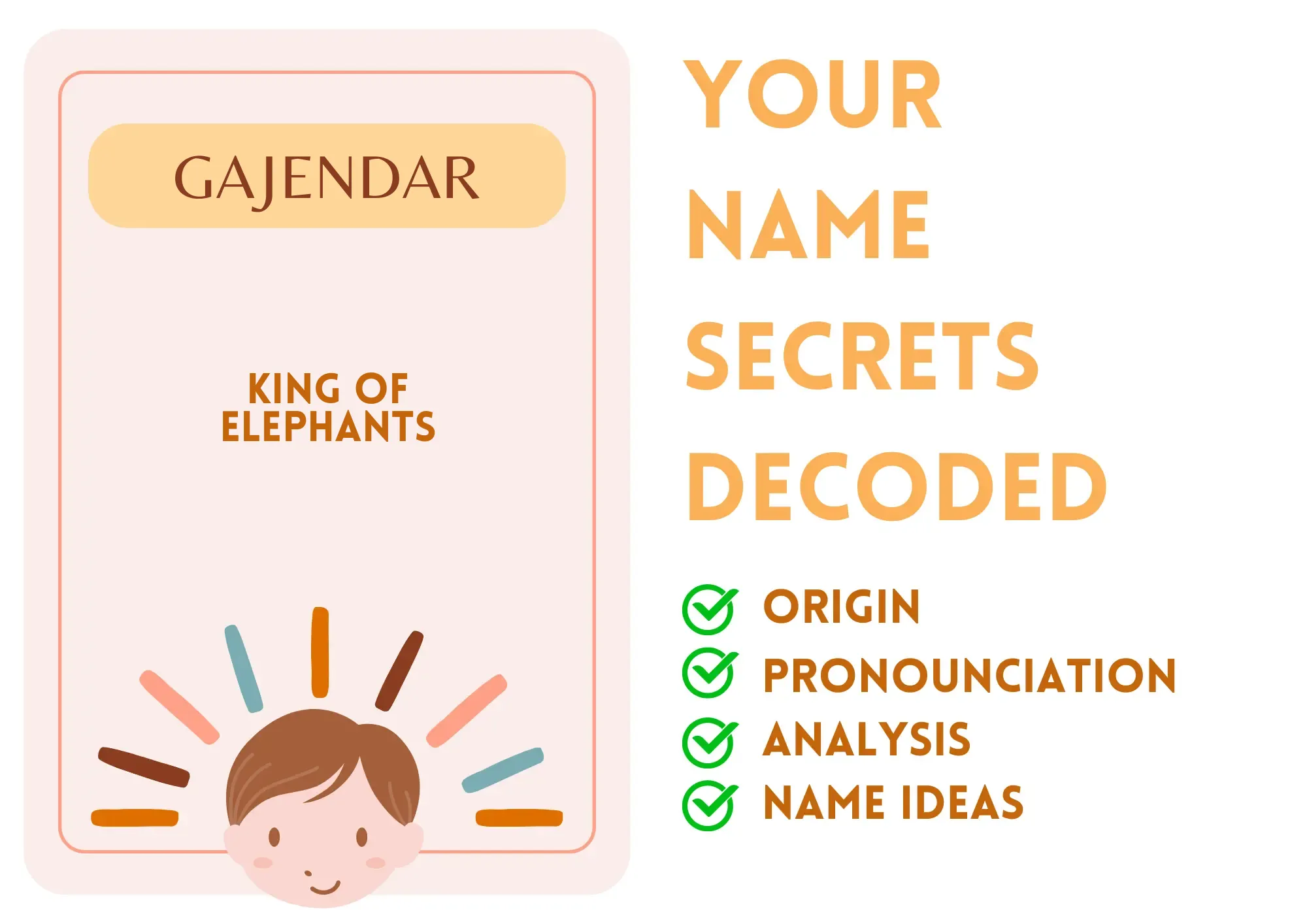
Gajendar
Gajendar is a name of Sanskrit origin, meaning 'king of elephants.' In Hindu culture, the elephant is a revered animal symbolizing wisdom, strength, and royal authority, often associated with Lord Ganesha, the elephant-headed god of beginnings and remover of obstacles.
Gajendar is predominantly used in India and among Hindu communities, where it is a masculine name reflecting qualities of nobility and leadership. It evokes strong cultural resonance due to the significance of elephants in Indian tradition and mythology.
People generally have a positive perception of the name, associating it with strength, wisdom, and authority. It is relatively easy to pronounce and write, with common nicknames like Gaju or Gaja.
Basic Information
Gender: Boy
Sounds Like: guh-JEN-dar
Pronunciation Explanation: The name is pronounced with three syllables, where the first syllable 'guh' is soft, the second syllable 'JEN' is accented, and the final syllable 'dar' is pronounced with a light emphasis.
Summary and Meaning
Meaning: king of elephants
Origin: The name Gajendar has Indian origins, deeply rooted in the Sanskrit language and Hindu culture.
Usage: Gajendar is traditionally a masculine name, embodying strength and leadership.
Name Number (Chaldean)
Name Number (Pythagorean)
Name Constellation (Nakshatra)
Name Zodiac Sign (Rashi)
Popularity (Global Rank)
Overall: 88875
Boys: 72681
Most Popular in
Religious and Cultural Significance
Religion: Hindu
Background: In Hinduism, Gajendar is significant as it connects to Lord Ganesha, symbolizing wisdom and prosperity. The elephant is a common figure representing divine beings and is revered for its intelligence and memory.
Cultural Significance: Elephants are deeply ingrained in Indian culture; they are symbols of royal authority and are often depicted in religious and cultural contexts.
Historical Significance: Historically, the elephant has played a significant role in royal processions, labor, and as a symbol of might in Indian kingdoms, which adds depth to the name Gajendar.
Popular Culture
Literature and Mythology: The name Gajendar is not directly prominent in specific literary works but resonates with characters in various Hindu mythological tales where elephants hold key roles.
Movies and Television: Occasionally characters named Gajendar or similar have appeared in Indian films, often depicting strength and leadership.
Feelings and Perceptions
Perception: Gajendar is viewed positively, with associations to strength, nobility, and wisdom. It evokes a sense of respect and admiration.
Positive Feelings: Majestic, strong, wise, respected, powerful.
Negative Feelings: May seem traditional and less common in modern naming trends.
Practical Considerations
Ease of Writing and Calling: Gajendar is relatively straightforward to write and pronounce. Comprising three syllables and eight letters, it may take a few tries for non-Hindi speakers but is still manageable.
Common Typos and Misspellings: Gajendar,Gajinder,Gajendhar,Gajindar
Common Nicknames: Gaju,Gaja,Gaj
Gajendar Popularity
Gajendar Usage and Popularity By Country
| Country | Rank (Overall) |
|---|---|
| Oman | 12466 |
| India | 18131 |
| Sweden | 31840 |
| New Zealand | 33723 |
| Australia | 105589 |
| Canada | 149654 |
| Indonesia | 169744 |
| United Kingdom | 182431 |
| United States | 344452 |
Gajendar Usage and Popularity By City
| City | Rank (Overall) |
|---|---|
| Delhi | 10532 |
| Washim | 6699 |
| HyderÄbÄd | 18665 |
| New Delhi | 11476 |
| Jaipur | 4510 |
| Bombay | 25939 |
| Pali | 493 |
| Faridabad | 3305 |
| Gautam Buddha Nagar | 8513 |
| Dehradun | 2586 |
Compatibility Analysis
Famous Persons Named Gajendar
No results found for Gajendar.
Related Names
Similar Sounding Names:
Ajendar,Gajendra,Gajanand,Gajanan

